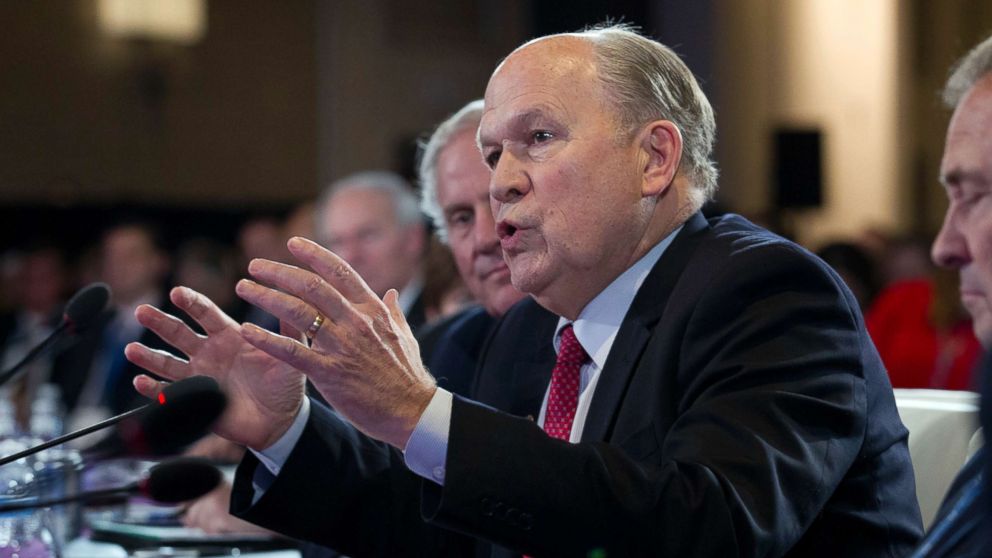Independent candidates unite to support each other's campaigns
These candidates face an uphill battle when running against political parties.

— -- Some independent political candidates are uniting to give themselves something party candidates get from their national organization: support and structure to help run stronger campaigns.
Unite America, a nonpartisan group based in Denver, announced its first-ever slate of candidates on Tuesday: five independents running for either governor or U.S. Senate.
“Independents have lacked access to the kind of support major party candidates have built literally over the past 100 years,” Nick Troiano, executive director of Unite America, said at a news conference at the National Press Club.
He noted his group is building a volunteer network, a donor community, and electoral infrastructure for these candidates that he says is “necessary to level the playing field with both political parties.” He noted Unite America includes a grassroots community of 20,000 people across the country.
The candidate slate includes Gov. Bill Walker of Alaska, the only independent in the nation elected as a governor. There are also two independents in the House of Representatives and two in the U.S. Senate.
Walker, who was a Republican before becoming an independent, noted he’s “not anti-party” but became an independent because “big issues are just not partisan issues. Healthcare is not a partisan issue. It’s a human issue.”
Also joining the slate is Kansas gubernatorial candidate Greg Orman, who came to national attention in 2014 when he challenged incumbent GOP Sen. Pat Roberts as an independent and came close to winning.
At one point, Orman led Roberts by 10 points in the polls, causing the GOP to send in reinforcements – Sens. Ted Cruz and Tom Coburn - to campaign with Roberts, and outside groups to spend millions. Roberts ended up winning by 10 points.
Orman told ABC News the most important lesson he took from that 2014 campaign was “that there is a real desire for fundamental change.”
“Voters really desperately want to vote for a candidate that inspires them,” he said.
Also on the Unite America slate are Terry Hayes, the Maine state treasurer who’s running for governor; Craig O’Dear, who’s challenging Democratic Sen. Claire McCaskill in Missouri; and Maryland Senate candidate Neal Simon.
But their battle is seen as uphill. History is not on the side of independents.
Professor John Weingart, associate director of the Eagleton Institute of Politics at Rutgers, noted "it’s rarely a rational decision to vote for an independent candidate. And I guess that's harsh, but the reason to vote for an independent if you’re pretty sure they can’t win is that you’re sending some kind of message.”
He added that “history shows and, I think the present argues, that it would be extremely difficult for independents to win except in the most rare circumstances.”
There have been those rare breakthroughs. Sen. Bernie Sanders of Vermont is probably the best example of an independent who has broken through, not only in his home state, but also on the national scene, in the 2016 presidential campaign. He was seen by a lot of national voters as a vote against the Washington establishment.
But the competition in the 2018 election will be fierce as Democrats fight to win at least one chamber of Congress and Republicans fight to keep control of both.
Polling shows a high rate of Democratic enthusiasm among voters and President Donald Trump made a fiery speech to conservatives at CPAC last week as part of his effort to rally the right.
None of the independent candidates showed concern about trying to break through the political firewall in a year of such partisan interest.
“The one common thing I hear is the frustration about the partisanship and people find it refreshing that there’s an alternative source to government,” Simon said of his campaigning around Maryland.
He and the others argued there is a strong desire in the country for representation from the middle of the political spectrum and a hunger for an anti-Washington candidate.
“Most of the country today is unrepresented in the United States Senate and in Congress in general. The representatives that we have are representing the two extremes. And you have the bulk of the country in the middle that feels politically homeless. That feels that they’re going to the ballot to choose the less of two evils. We want to represent that majority in the middle that is most of the country,” he said.
A Gallup poll from January shows 44 percent of the country identifies themselves as politically independent.
Independent candidates also combat the fact that voters want their vote to matter.
Sabato's Crystal Ball’s Geoffrey Skelley wrote last week: “Independent and third-party candidates tend to do poorly in most partisan elections, but they have a particularly poor track record in Senate contests. Only 11 candidates in 14 elections have ever won at least 35% of the vote while facing a Democrat and a Republican.”
But Troiano argues there is a path for independents.
“If you vote a Democrat or a Republican you know what you’re getting, which is the status quo,” he said. “The biggest way to make a difference and the best way to send a message is to tell the parties they’re not entitled to our votes, they have to earn them.”
Walker acknowledged that his 2014 campaign experience taught him what an uphill climb independent candidates face. His advice to his fellow independents is to outwork the competition.
“As an independent you have to work a little harder, you have to get up a little earlier, go to bed a little bit later, and you have to spend a little more time with people. Because then they get to know who you are and then they get to vote for that person because of what they learned about that person. I think that’s really an opportunity,” he said.




